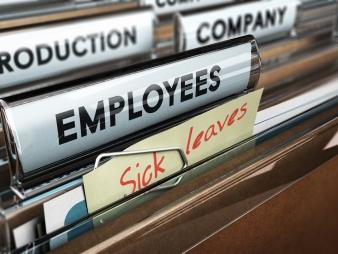On March 18, President Trump signed the Families First Coronavirus Response Act (“FFCRA”).
Among other targeted COVID-19 relief efforts, the Emergency Family and Medical Leave Expansion Act (“EFMLEA”) potion of the FFCRA provides up to 12 weeks of partially paid coronavirus-related family leave and the Emergency Paid Sick Leave Act (“EPSLA”) portion provides up to 2 weeks of paid leave for certain COVID-19 related absences. The EFMLEA and EPSLA provisions apply to almost all employers with fewer than 500 employees.
A narrow exception exists for employers with fewer than 50 employees if providing leave for one purpose – to take care of children at home due to school closure or day care availability — would “jeopardize the viability of the business as a going concern.” This exception does not apply to requests for leave for other qualifying reasons under FFCRA. The Department of Labor’s regulations have made clear that a business claiming this exemption must make and document specified findings to support the decision.
To ease the burdens these paid leave provision place on employers, the FFCRA provides a refundable tax credit equal to 100% of qualified EFMLEA and EPSLA wages paid by such employer, as long as proper documentation is obtained, created and retained.
The FFCRA provides minimal guidance on the recording keeping and compliance requirements related to the tax credit. The Secretary of the Treasury is provided with regulatory authority to issue regulations and guidance related to minimizing compliance and recordkeeping burdens associated with the tax credit. Thus far, the IRS has only issued a single press release with a FAQs section related to guidance on the FFCRA’s tax credit recordkeeping and compliance requirements. The IRS has instructed eligible employers to retain the following documents:
- Written request from the employee seeking leave. The written request should contain: (i) the employee’s name; (ii) the dates for which leave is requested; (iii) a statement of the COVID-19 related reason the employee is requesting leave; (iv) written support for such reason; and (v) a statement that the employee is unable to work, including by means of telework, for such reason.
- If the requested leave is based on a quarantine order or self-quarantine advice from a health care professional, the written request should also include: (i) the name of the governmental entity ordering quarantine or the name of the health care professional advising self-quarantine and (ii) if the person subject to quarantine or advised to self-quarantine is not the employee, that person’s name and relation to the employee.
- If the requested leave is based on a school closing or child care provider unavailability, the written request should also include: (i) the name and age of the child (or children) to be cared for; (ii) the name of the school that has closed or place of care that is unavailable; (iii) a representation that no other person will be providing care for the child during the period for which the employee is receiving family medical leave; and (iv) in respect to a child older than 14, a statement that special circumstances exist requiring the employee to provide care.
- Documentation to show how the employer determined the amount of qualified sick and family leave wages paid to employees that are eligible for the credit. Such documentation should include records of work, telework and qualified sick leave and qualified family leave.
- Documentation to show how the employer determined the amount of qualified health plan expenses that the employer allocated to wages.
- Copies of completed filings made to the IRS requesting the tax credit. This would include copies of the completed Form 941 (Employer’s Quarterly Federal Tax Return) and Form 7200 (Advance Payment of Employer Credits Due to COVID-19).
The IRS recommends that employers retain the aforementioned records for a period of at least 4 years after the date the tax becomes due or is paid, whichever comes later. Additional guidance is expected to provide further details on adequate recordkeeping. It is important that employers establish and maintain record retention policies to prove eligibility for the tax credits.
If you have any questions about the FFCRA or COVID-19 pandemic and its effect on your business, CCJ attorneys are here to help. We will continue to provide updates as additional information and resources become available.
Tagged In:FFCRAIRSRecordkeepingTax Credit




